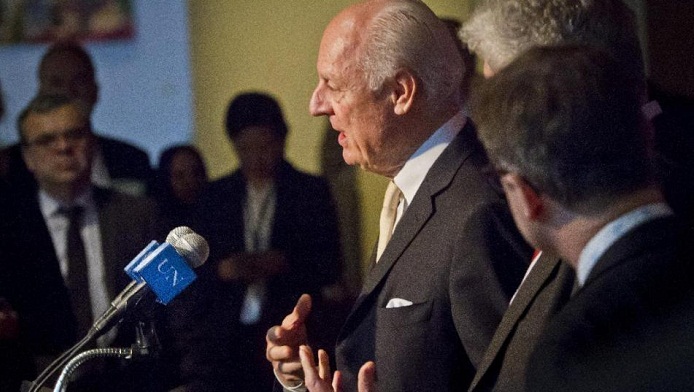Last Saturday, foreign ministers from about 20 nations agreed in Vienna to an ambitious yet incomplete plan that sets a Jan. 1 deadline for the start of negotiations between Syrian President Bashar Assad`s government and opposition groups. Within six months, the negotiations are to establish a "credible, inclusive and non-sectarian" transitional government that would set a schedule for drafting a new constitution and holding a free and fair U.N.-supervised election within 18 months.
Neither the Syrian government nor opposition groups were present at the talks, which brought together the main foreign backers of both sides.
Staffan de Mistura, the U.N. special envoy for Syria who represented the United Nations at the Vienna talks, told reporters after briefing the General Assembly behind closed-doors that a national cease-fire in Syria is now more likely because the countries participating in two rounds of talks in Vienna "have an interest in seeing a cease-fire taking place."
In Vienna, the foreign ministers failed to reach consensus on which groups other than the Islamic State and al-Qaida affiliates would not be eligible to be part of a cease-fire. Jordan was chosen to oversee a process that would identify which groups should be considered for identification as terrorists.
Al-Moualimi said de Mistura told the General Assembly that Jordan will hold a meeting in mid-December that will focus on defining which groups are part of the opposition and which groups are going to be considered terrorists.
De Mistura said the Vienna participants want "as large as possible a cease-fire" and that the foreign ministers agreed to disagree about a number of issues — including about the future of Assad, whose departure is a key opposition demand for participating in new talks.
He said the opposition should look at the package that the ministers did support which calls for a transitional governing body for Syria with full executive powers, a new constitution and elections that go beyond parliament.
The war in Syria has killed more than 250,000 people, left 11 million uprooted from their homes, and allowed Islamic State militants to carve out significant parts of Syria and Iraq for their would-be caliphate. Europe and Syria`s neighbors, meanwhile, are struggling to cope with the worst migrant crisis since World War II.
More about:















































